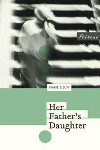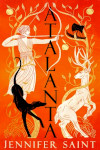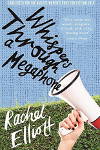Marie Sizun – Her Father’s Daughter
Posted 20th June 2016
Category: Reviews Genres: 2000s, Commentary, Domestic, Drama, Historical, Translation
2 Comments

Don’t tell children only half the secret.
Publisher: Peirene Press
Pages: 144
Type: Fiction
Age: Adult
ISBN: 978-1-908-67028-1
First Published: 2005; 13th June 2016 in English
Date Reviewed: 9th June 2016
Rating: 5/5
Original language: French
Original title: Le Père de la Petite (The Father Of The Little)
Translated by: Adriana Hunter
Her Father’s Daughter is a superb book about something that doesn’t often get thought of when we talk about war – the effect of a soldier’s homecoming on his very young children. It’s also a study in how war messes with the emotions of those back home, and in this case the damning effects that can have.
Sizun writes in the third person from the perspective of the child. France, the girl at hand whose show-of-patriotism name is rarely used, is at once spoiled, kind, and almost precocious. The author brilliantly shows how, for example, a child may be annoying but not at fault – we all know this, that children do not understand subtleties especially when adults don’t answer their questions comprehensively, but it’s how Sizun goes about her detailing, putting the point out there in an ironically comprehensive way.
The book studies the change when France’s father returns, after which she’s no longer the only person in her mother’s life and no longer possesses her.
‘When your poor little daddy comes home’… Off hand. Just like that. […] But right there, in what her mother said, in those words, something loomed before her, something quite new. Something that intruded into the intimate, familiar world of the kitchen. Something the child perceives as a threat. When. Come home.
This is where Sizun addresses the breach: to the mother, everything will right itself and life will be good again but to France a stranger is set to arrive, a man whose role she has no concept of. She doesn’t know a father is like a mother and the photograph of him in the apartment has no meaning for her. She’s resentful, sees disruption ahead in the life she likes. Her mother has spoiled her to the point of madness, letting her draw on the wall, sing loudly inside, even letting her pick her (the mother’s) outfits. We can assume the mother does this out of sadness and, on some level, guilt.
What is a father? The notion of fatherhood is beyond the child… Fathers are found in fairy tales, and they’re always slightly unreal or not very kind.
In Sizun’s child-sized detailing we can read between the lines – we can tell what this big ‘secret’ of the mother’s is, where the ‘baby’ has gone. Sizun shows how important it is to tell a child the why instead of just telling them it was a dream.
When the father comes home the parents don’t perform a proper introduction, instead they push a kiss on a child from a stranger. The father is strict – he doesn’t like the drawing and singing – and it’s a while before France sees his fatherly side, Sizun demonstrating what happens when there are different parenting styles with the addition of having to adapt to life after living in a prisoner of war camp. The father does not represent all fathers of his situation – the author also shows a man who has come home in good spirits, a neighbour with a daughter France’s age. And some of the changes France must make are due to the time period – seen but not heard.
As her father starts to treat her with kindness she turns against her mother. Does the mother use poor discipline as a weapon, as a way of having control in spite of her own mother’s words? Is it down to the guilt she feels over her illicit situation? The mother is an ambiguity; Sizun leaves her open for your interpretation.
Her Father’s Daughter is downright splendid. It tells an unfamiliar tale in a particularly affecting way and succeeds at making you question a child’s actions in a child’s context because you’re never out of her head. Whilst translated (Adriana Hunter is on top form) the word choice is everything, the length of the sentences key. This is a World War II book you don’t want to miss; and it’s in the top tier of Peirene Press’s acquisitions.
I received this book for review from the publisher.
Related Books
July 15, 2016, 2:04 pm
Jenny: I’d like to think it’ll make it across the pond soon :) No, and I’ve not heard of Magorian so I’ll have a look – it’s a fascinating subject, I think. Goodnight Mr Tom is mostly on the one relationship, isn’t it? I’d say you could safely like both ;)
2 Comments
Comments closed
























June 22, 2016, 12:49 pm
Oh bother, my library doesn’t have this! I was just thinking how great it sounded, and I do always want to read more women in translation.
Relatedly, did you ever read the Michelle Magorian book Back Home? It’s not exclusively about a soldier father coming home and the impact of that on his children, but that’s an element. It’s about a girl called Rusty who was evacuated to America during World War II and is now coming home to England, where she’s trying to adjust to what her life is now going to be like. And her mother was a car mechanic and now is expected to fit into this pre-war wife-and-mother box that doesn’t fit her well anymore, and then the father comes home and throws everything into even more chaos. It’s really good! (I’d say “even better than Good Night Mr. Tom,” but I don’t want people to get mad at me.